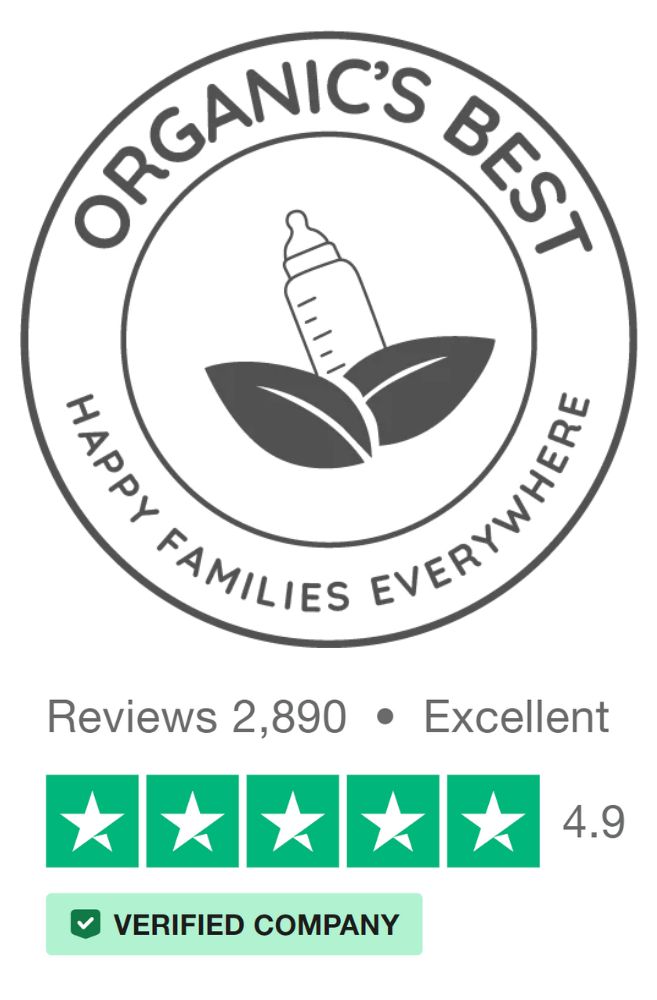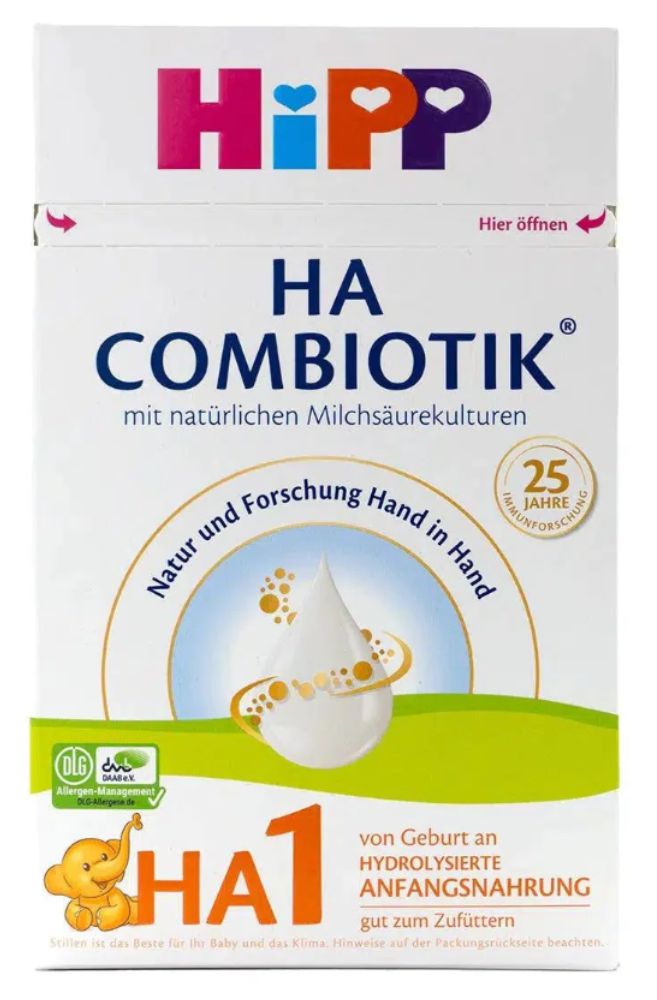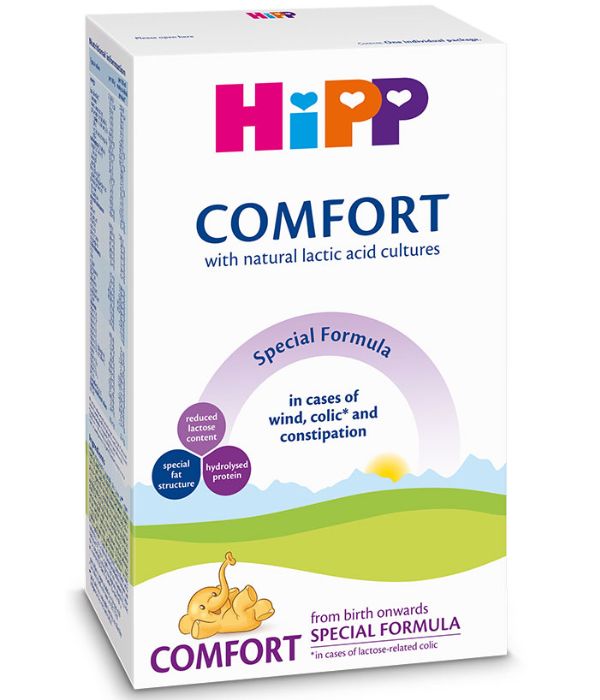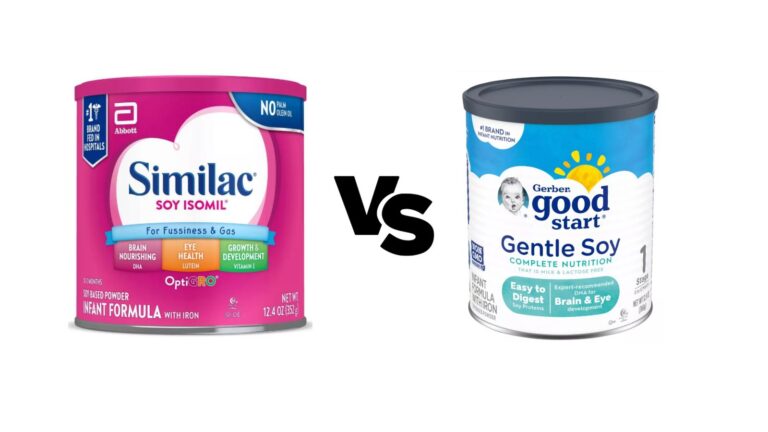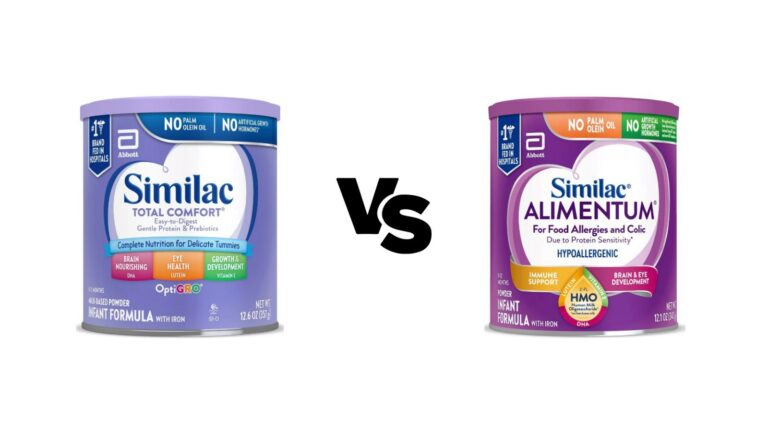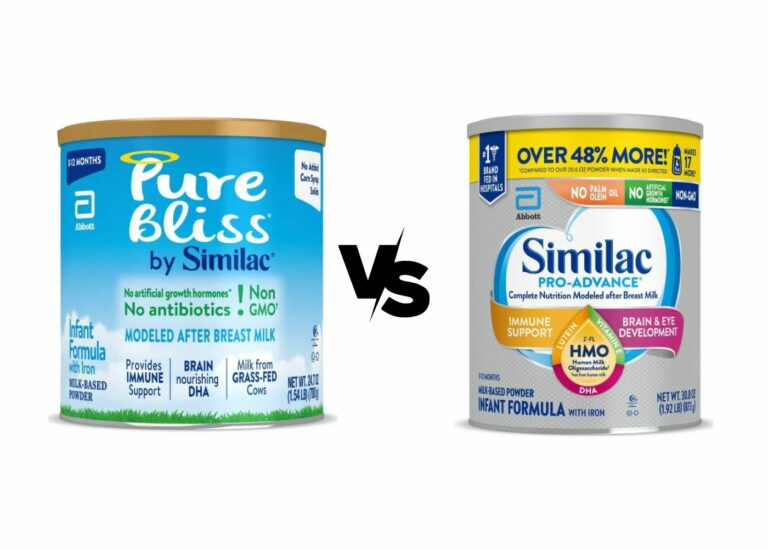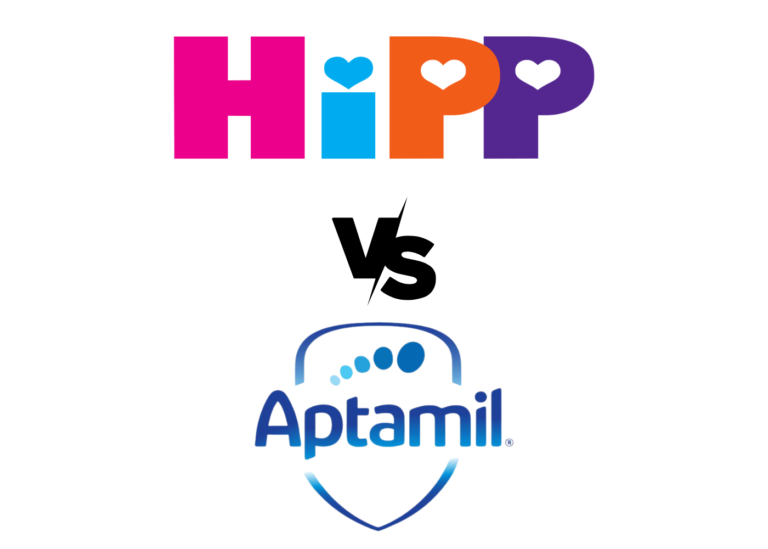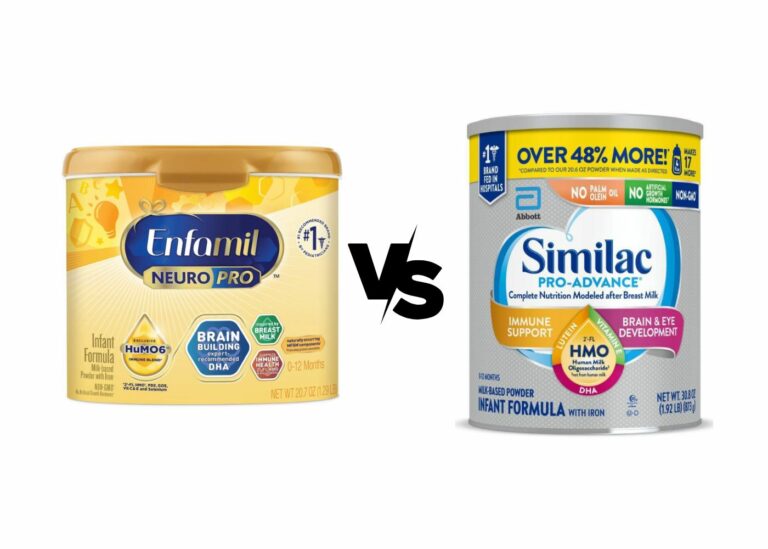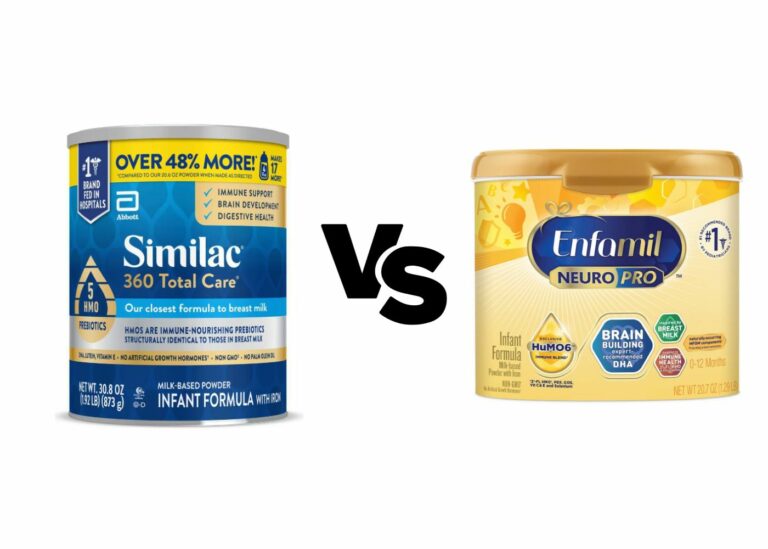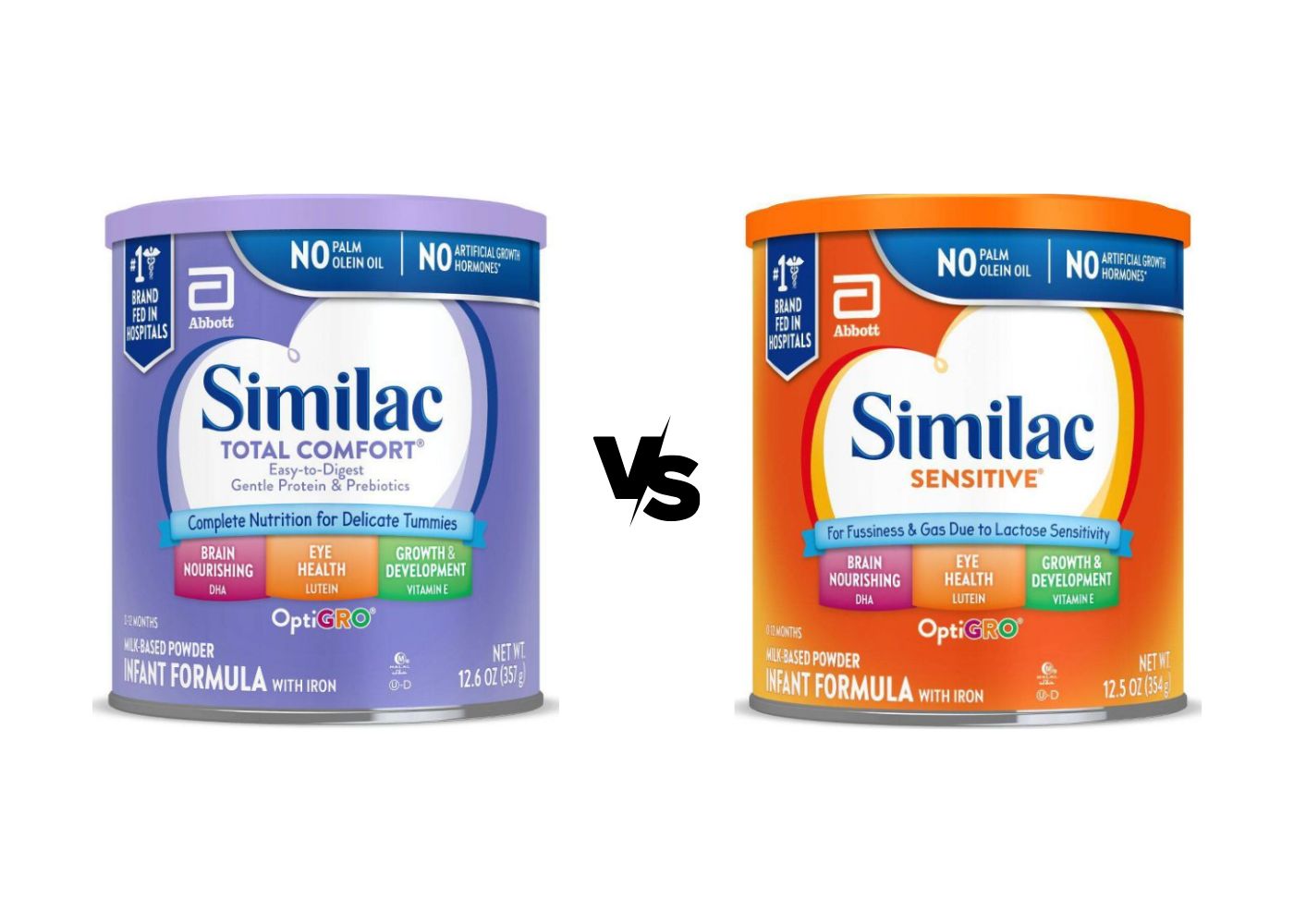
Key Differences Between Similac Total Comfort and Sensitive
| Similac Total Comfort | Similac Sensitive | |
|---|---|---|
| Protein Source | Partially Hydrolyzed Protein | Milk Protein Isolate |
| Carbohydrate Source | Corn Maltodextrin | Corn Syrup |
| Fat Source | High Oleic Safflower Oil, Soy Oil, Coconut Oil | High Oleic Safflower Oil, Soy Oil, Coconut Oil |
| DHA Source | Schizochytrium sp oil | C.Cohnii oil |
| Added Prebiotics | Yes (Short-chain Fructooligosaccharides) | Yes (Short-chain Fructooligosaccharides) |
| Added Probiotics | No | No |
| Palm Olein Oil | No | No |
| Suitable For | Lactose sensitivity, delicate tummies with digestive issues | Fussiness and gas due to lactose sensitivity |
| Artificial Growth Hormones | No | No |
Just entered the world of motherhood and tangled up in the Similac Total Comfort vs Sensitive debate?
The journey to find the perfect baby formula can be confusing, leading you to question every scoop – is this the best one for my little one’s delicate tummy?
This in-depth comparison between Similac Total Comfort and Similac Sensitive will shed some light and hopefully lead you closer to that sweet spot of complete baby comfort.
Let’s dive in!
*Related reads: Similac Total Comfort vs Pro-Total Comfort | Similac Sensitive vs Similac 360 Total Care Sensitive
Our Short Answer
We have no trouble choosing our winner in this comparison; we choose Similac Total Comfort for the following reasons:
1. It uses partially hydrolyzed protein, making it much easier to digest for babies with digestive problems.
2. It uses corn maltodextrin instead of corn syrup solids. It has less sugar and a more neutral, less sweet taste.
3. Uses a richer source of DHA than Similac Sensitive.
Both formulas are designed for infants without severe allergies and lactose digestion issues, but Total Comfort goes a step further and uses hydrolyzed protein.
We encourage you to take a look at the alternatives we recommend below before purchasing anything.
With over 100,000 orders delivered globally since 2019, Organic's Best offers clean, safe, and nutritionally rich formulas and snacks.
Free shipping over $100, commitment to freshness and authenticity.
- Express delivery in 2 to 5 business days
- Sourcing from European manufacturers
- Minimum shelf life of 6 months
- Climate-Controlled Warehouse
Give your little one the best start.
CODE 'BLW' for a 5% discount in all orders
Overview of the two formulas
Similac Total Comfort is suitable for babies with lactose sensitivity, with partially hydrolyzed protein and prebiotics.
Similac Sensitive addresses fussiness and gas caused by lactose sensitivity, with nutrients for brain and eye development and no artificial growth hormones.
Similac Total Comfort
Designed especially for infants with delicate tummies, Similac Total Comfort Infant Formula offers complete nutrition that is suitable even for babies with lactose sensitivity.
Its unique formulation includes partially hydrolyzed protein and prebiotics to aid in soft stool production.
The formula also encompasses OptiGRO, an exclusive composition entailing DHA, Lutein, and Vitamin E, vital for your baby’s overall growth and development of the brain, eye, and immune system.
Similac Sensitive
Similac Sensitive is a milk-based infant formula engineered specifically for sensitive tummies.
It offers a complete nutrition solution when fussiness, gas, or mild spit-up due to lactose sensitivity poses a challenge.
It has an exclusive blend of nutrients supporting your baby’s brain and eye development.
Significantly so, Similac has set itself apart as the first leading infant formula brand with no artificial growth hormones.
*Related: Similac Sensitive vs Pro-Sensitive
Nutritional Composition
Similac Total Comfort uses partially hydrolyzed protein, while Similac Sensitive uses milk protein isolate.
Total Comfort has lower carbohydrate content with corn maltodextrin, and both formulas have similar fat content with different DHA sources.
Protein Content
In Similac Total Comfort, the protein element is derived from Whey Protein Hydrolysate. This specially processed protein has been partially broken down to make it easier for delicate tummies to digest. It offers 2.32g of protein per 5 fl oz serving.
Similac Sensitive, on the other hand, utilizes Milk Protein Isolate as its protein source, contributing to 2.1g of protein per serving size.
Similac Total Comfort is ahead in terms of protein content since it uses partially hydrolyzed protein; this means it’s pre-digested, making it easy for babies with digestive issues to process.
Even though Similac Sensitive uses milk protein isolate, this type of protein is not as easy to digest as hydrolyzed protein.
*Read: Hydrolyzed Baby Formula
Carbohydrate Content
Carbohydrates serve as a major energy source for babies.
Similac Total Comfort contains 10.7g of carbohydrates per serving, primarily derived from Corn Maltodextrin.
Similac Sensitive includes slightly higher carbohydrate content at 10.9g per serving, with Corn Syrup being its primary source.
Both types of carbohydrates provide steady energy while reducing gas and fussiness due to lactose sensitivity. However, Similac Total Comfort is ahead again for using maltodextrin instead of Syrup.
Corn maltodextrin has less content of simple sugars than corn syrup. It is also less sweet and has a more neutral flavor, which it’s better for babies.
Fats and Oils
For both formulas, High Oleic Safflower Oil, Soy Oil, and Coconut Oil serve as key sources of fats that contribute around 5.4g per serving size, providing essential healthy fats needed for brain development and overall growth.
However, they differ in DHA sources; Similac Total Comfort utilizes Schizochytrum sp oil while Similac Sensitive uses C.Cohnii oil – both these oils are rich sources of DHA supporting brain development and eye health.
Both formulas are fairly similar in fat content, but some evidence suggests that Schizochytrium sp oil may be a better source of DHA than C. Cohnii oil.
One study found that infant formula supplemented with DHA from Schizochytrium sp microalgae resulted in better growth and tolerability in healthy-term infants than formula supplemented with C. Cohnii oil.
Probiotics and Prebiotics
Both formulas use the exact prebiotic and no probiotics.
Both Similac Total Comfort and Similac Sensitive integrate prebiotics into their formulas in the form of Short-chain Fructooligosaccharides.
These prebiotics aid digestion, help maintain gut health, and encourage softer stools, making them a blessing for sensitive baby tummies.
However, neither formula contains probiotics which provide added immune support and are beneficial for some babies.
Best Places to Buy Similac Total Comfort and Sensitive


Similac Total Comfort
Buy Similac Total Comfort at Target
Buy Similac Total Comfort at Walmart
Similac Sensitive
Buy Similac Sensitive at Target
Buy Similac Sensitive at Walmart
What are the best alternatives to Similac Total Comfort and Sensitive?
There are better sensitive formulas in the market.
These are the ones we would give our baby:
-
Buy at Organic's Best Buy at The Milky Box
HiPP Hypoallergenic (HA) Combiotic Formula is crafted for infants with milk protein sensitivities.
- Extensively Hydrolyzed Proteins
- Natural Prebiotics & Probiotics from real Breast Milk
- Lactose-Based
- Nutrient-Rich
- Free from artificial sweeteners, GMOs, gluten, soy, peanuts and egg
We earn a commission if you make a purchase, at no additional cost to you.
-
Buy at Organic's Best Buy at The Milky Box
Hipp Comfort is designed for tiny tummies struggling with colic and constipation while supporting natural digestion in the most nutritious and organic way.
- Hydrolyzed Milk Protein
- Reduced Lactose
- Natural Probiotics & Prebiotics
- Nutrient-Enriched
- Allergen-Free
We earn a commission if you make a purchase, at no additional cost to you.
For babies with hypersensitivity, our favorite is Hipp HA Hypoallergenic formula due to its organic nature and use of natural ingredients. It’s perfect for a hypoallergenic diet without missing out on necessary nutrients. *Read: Hipp HA vs Similac Alimentum
Try options like Hipp Comfort or Hipp Anti-Reflux for mild digestive concerns without allergies, as they are specifically formulated to resolve specific issues such as colic and reflux, respectively. *Read: Hipp Comfort vs Hipp Anti-Reflux
Lastly, goat milk formulas could be an excellent choice to explore if your baby doesn’t have a cow’s milk allergy. Top-tier options like Kendamil Goat and Nannycare offer natural, high-quality formulations that aid digestion while providing complete nutrition for your growing baby. *Read: Kendamil Goat vs Nannycare
Conclusion
We hope this comparison between Similac Total Comfort and Similac Sensitive has helped you make an informed decision for your baby.
Again, we recommend you look at the alternatives before purchasing Similac formula, as we sincerely think there are better options.
Happy feeding!
We’re Maria and Alberto, a married couple and educators who are nutrition enthusiasts. Even before we had kids, we were already crazy about nutrition.
We’d read scientific articles, watch videos from nutritionists, and spend hours listening to nutrition podcasts.
Today, we continue doing this, but in a different way, as we’ve learned to sift through the noise and trends. Nutrition, like any other field of knowledge, the more you read and learn, the more you develop a comprehensive understanding of reality, and that’s what has happened to us.
Before having our first child, we focused on learning everything we could about child nutrition, using the same techniques we had already employed, backed by our extensive knowledge in nutrition.
Our mission is to help other parents with their children’s nutrition, to help them become the best versions of themselves.
If we are what we eat and drink, which is absolutely true, let’s do it right!


